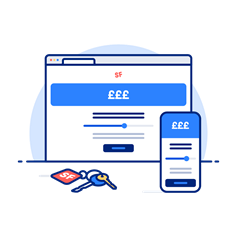Cut your overdraft costs today!
Living payday to payday is common for many of us. At certain points in our lives it can be necessary. If you find that your overdraft is your go-to buffer to get you through those last few days before payday, it’s important you keep overdraft charges and fees to a minimum.
Here are our top five tips for paying less for your overdraft:
1. Do you need a break? Ask for help if you need it.
At the beginning of the Covid-19 pandemic, the regulator the Financial Conduct Authority (FCA) put in place temporary rules to help those struggling with overdraft costs. This included lowering interest rates and/or offering up to £500 interest-free for three months. Since October 2020, though, the regulator no longer required banks to offer this blanket help.
Don’t forget, if you're with a different bank, you can still ask for help, but it'll be tailored to your circumstances. You'll need to call your bank and let them know you’re struggling so they can see if there’s something they can do to help
2.What do you owe?
Overdrafts can be one of the most expensive types of debt and - as they don’t have set repayment terms or bills, they can be hard to get out of. The first step is understanding how much you owe. To do this you need to check:
-
- Your balance
- Your overdraft limit
- Your latest bank statements
- It’s also helpful to look at how much you’re regularly using and what the balance is just before your payday to understand how bad it can get.
3. Make a plan
Yes, it sounds boring, but if you could be paying off your overdraft you should be. The first step is to understand where your money is going. If you’ve got no money left at the end of the month to pay it off, consider if you could earn additional income, sell unwanted items or take any other proactive measures to get money to use to pay off the overdraft. Equally, if you have savings you’d usually rather not touch, paying off your overdraft could save you a lot of money in the long-run, so it may be worth it.
A £1,000 overdraft costing £20 a month in interest costs £240 a year, but the same amount in an easy-access savings will probably earn about £10 a year in interest if you’re lucky!
4. Switch it up!
If you really can’t make a plan to pause your charges or pay off your overdraft, could you switch bank accounts to one where you could access a 0% overdraft? Check out this article on Which to understand the best bank accounts for arranging overdrafts.
5. Transfer to a 0% credit card
While it may sound odd to consider taking out a credit card to pay off an overdraft, hear us out. If you could access a 0% interest rate balance transfer, you could start to pay off your overdraft (for good) but stagger those repayments over a period of time without having to pay any interest. Find 0% credit card deals here, but remember to make note of how long the card is 0% interest for - it won’t be forever and you need to ensure you pay off your debt before the interest charges kick in.
As your employer works with us at Salary Finance, you may also be able to access Advance which allows you to get some of your pay before payday, click here to find out if you could be using Advance instead, to iron out those spending peaks.
Sign up to our newsletter
Our newsletters bring you the latest articles to help you improve your financial wellbeing.
If you want to consent to receiving our newsletter please enter your email below to subscribe. If at any point you want to withdraw your consent please email hello@salaryfinance.com. For more information about how we use your personal data see our privacy notice.



